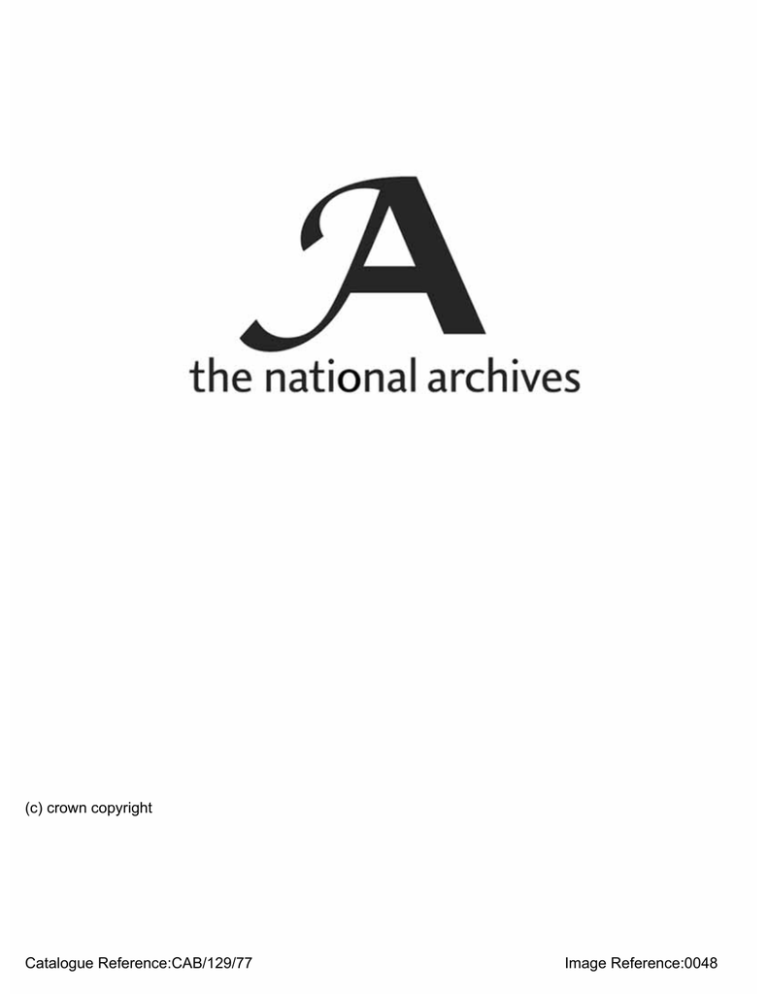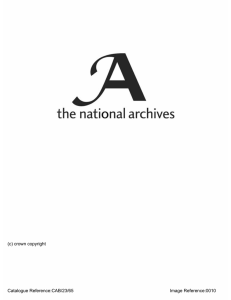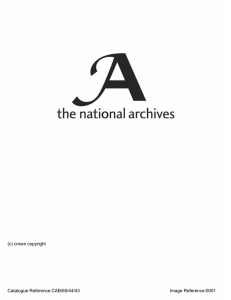(c) crown copyright Catalogue Reference:CAB/129/77 Image Reference:0048
advertisement

(c) crown copyright Catalogue Reference:CAB/129/77 Image Reference:0048 r?4 THIS DOCUMENT IS THE PROPERTY Printed OF HER BRITANNIC for the Cabinet. October MAJESTY'S GOVERNMENT 1955 SECRET Copy N o . C P . (55) 148 13th October, 1955 CABINET ROYAL COMMISSION ON CAPITAL PUNISHMENT MEMORANDUM BY THE SECRETARY OF STATE FOR THE H O M E DEPARTMENT AND MINISTER FOR W E L S H AFFATRS AND THE SECRETARY OF STATE FOR SCOTLAND On 29th July, 1954, the the then H o m e Secretary recommendations made in Punishment (C.C. (54) 56th Cabinet considered a memorandum, C. (54) 166, by and the Secretary of State for Scotland on the the report of the R o y a l . Commission on Capital Conclusions, Minute 3). 2. The Cabinet agreed not to accept the three major recommendations of the Commission (that is, (i) the raising from 18 to 21 of the statutory age limit below which sentence of death may not be imposed; (ii) conferring upon the jury a discretion to decide whether there are such extenuating circumstances as to justify substituting a sentence of life imprisonment for one of death; and (iii) the abrogation of the McNaghten Rules in regard to insanity), but decided that no final decision should be announced until after Members of Parliament had had an opportunity of expressing their views. The Cabinet also agreed that legislation should not be introduced giving effect to certain of the minor recommendations of the Royal Commission. 3. , The report of the Royal Commission was debated in the House of Commons on 10th February, 1955, on a Government Motion to take note of the Report. The Government spokesmen indicated that the Government had provisionally formed the view that the three major recommendations should not be accepted, but that before coming to a final conclusion they wished to take account of the views expressed by Parliament. The debate turned mainly on the proposal, raised by an amendment to the Government Motion, that the death penalty should be suspended for a number of years. In so far as the recommendations of the Royal Commission were referred to, there was substantial support for the view that it was right to reject the first two of the recommendations referred to in paragraph 2 above. (Proposal (ii) had already been strongly criticised in the House of Lords.) There was rather more difference o f opinion about proposal (iii), but no one could suggest any satisfactory alternative to the McNaghten Rules, and there was little support for the proposition that the Rules should be abrogated altogether. x 4. Nothing was said in the debate, or has been said subsequently, to cause us to suggest any modification of the conclusions reached by the Cabinet on 29th July, 1954. U p to the present, the time has not seemed opportune for making any further statement as to the Governments decisions. It would not have been appropriate to make a statement on this controversial matter before the general election; and since then it would have been difficult to dissociate a general statement from particular cases which were arousing public interest. The Howard League, however,-recently submitted a memorial, signed by a number of well­ known people, urging that capital punishment be abolished or that at any rate the recommendations of the Royal Commission be adopted, and we think it probable that as soon as Parliament reassembles there will be Questions as to the Governments intentions. 48895 63 ^ t) 5. W e accordingly seek authority to announce that the Government have given careful consideration to the views expressed in the debates in both Houses and have reached the conclusion that they cannot accept the main recommendations of the Royal Commission and do not at present propose to introduce legislation to deal with the other recommendations. It would be explained that the Government did not necessarily accept all the minor recommendations (some of which are controversial) but would reserve a decision until there was some prospect of legislation; and that those recommendations which were accepted by the Government and could be carried out administratively have, so far as possible, been put into effect. G. L L - G . J. S. 12th October, 1955.







